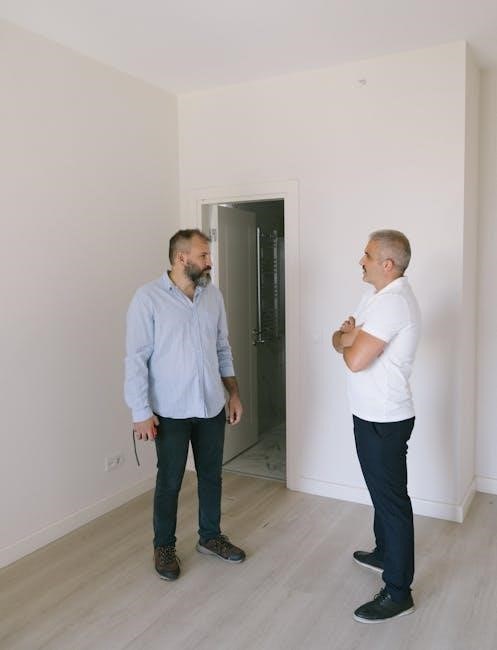A Georgia Rental Agreement PDF is a legally binding contract outlining terms between landlords and tenants, ensuring compliance with state laws. It’s customizable and available as templates for residential and commercial properties.

Key Components of a Georgia Rental Agreement
A Georgia Rental Agreement outlines essential details such as tenant and landlord information, property description, lease duration, payment terms, and security deposit requirements.
1.1 Tenant and Landlord Information
The Georgia Rental Agreement PDF requires detailed information about both the tenant and landlord, including full names, addresses, and contact details. This ensures clarity and accountability for both parties. The landlord’s section typically includes their legal name and property management company, if applicable, while the tenant’s section lists all occupants. Accurate identification of both parties is crucial for enforcing the agreement and resolving disputes. This section also establishes a clear line of communication, ensuring both parties can reach each other regarding lease-related matters. Proper documentation of this information is essential for legal compliance and maintaining a formal rental relationship.
1.2 Property Description
The Georgia Rental Agreement PDF includes a detailed description of the rented property to avoid disputes and ensure clarity. This section specifies the property’s address, type (residential or commercial), and any unique features. It outlines the intended use of the property, such as solely for residential purposes or allowing home-based businesses. The description may also include details about shared spaces, parking, or specific amenities like a backyard or pool. This section ensures both parties agree on the property’s condition and usage, providing a clear understanding of what is being rented. Accurate property description is essential for legal compliance and maintaining a transparent rental relationship.
1.3 Lease Duration
The Georgia Rental Agreement PDF specifies the lease duration, outlining the start and end dates of the tenancy. This section clarifies whether the agreement is for a fixed term or month-to-month. Fixed-term leases typically last for one year, while month-to-month agreements renew automatically. The document may also include details about renewal options or automatic extensions. Clear lease duration terms prevent disputes and provide stability for both landlords and tenants. It’s essential to define the timeframe to establish a legally binding timeline for occupancy and payment obligations. This section ensures both parties understand their commitments and the expected duration of the rental relationship. Accurate lease duration is crucial for maintaining order and compliance with Georgia rental laws.

Types of Georgia Rental Agreements
Georgia rental agreements include residential and commercial leases. Residential agreements are for personal housing, while commercial agreements cover business properties, each tailored to specific needs.
2.1 Residential Lease Agreement
A Georgia Residential Lease Agreement is a legal contract between a landlord and tenant for residential property. It outlines terms like rent, duration, and tenant responsibilities. Typically for a fixed term, this agreement ensures both parties’ rights are protected under Georgia law. Rent is usually due monthly, with specifics on payment methods and due dates. Tenants must adhere to lease terms, including property maintenance and noise policies. The agreement also covers renewal options or termination notices. Smoking and visitor rules are often included to maintain property standards. This document is essential for establishing a clear, legally binding relationship, ensuring compliance with state-specific regulations.
2.2 Commercial Lease Agreement
A Georgia Commercial Lease Agreement is a legally binding contract tailored for business-related property rentals. It outlines specific terms such as rent, lease duration, and permissible property uses, reflecting the unique needs of commercial operations. Unlike residential leases, commercial agreements often include clauses related to business activities, like operational hours or exclusive use rights. The lease must comply with Georgia state laws, ensuring both landlord and tenant rights are protected. Renewal or extension terms may differ, and security deposit requirements can be more substantial. Typically, such agreements are more complex, sometimes necessitating legal advice to ensure all business-specific clauses are appropriately addressed. Standard templates are available, but customization is common to suit individual commercial arrangements.
Lease Terms and Conditions
Lease terms outline payment details, due dates, renewal policies, and tenant responsibilities, ensuring compliance with Georgia laws and protecting both parties’ rights.
3.1 Rental Payment Details
Rental payment details in a Georgia lease agreement specify the amount, due date, and payment methods; Typically, rent is due on the first of each month, with late fees applied after a grace period. Tenants must pay rent without deductions or offsets. The agreement may outline accepted payment methods, such as checks, bank transfers, or online platforms. Landlords often require the first month’s rent and a security deposit before occupancy. Clear payment terms ensure both parties understand their financial obligations, preventing disputes. Rent increases must comply with Georgia laws and be disclosed in advance. Proper documentation of payments is essential for transparency and legal compliance.
3.2 Renewal/Extension Policies
Rental agreements in Georgia often include renewal or extension policies to outline the process for continuing the tenancy. Typically, a lease agreement may automatically convert to a month-to-month arrangement if no renewal is requested. Landlords and tenants must agree in writing to extend the lease, with terms potentially differing from the original agreement. Renewal terms should be communicated in advance, usually 60 days before the lease expires, to ensure both parties are informed. If no renewal is sought, proper notice must be given to avoid legal issues. Clear renewal policies help maintain a smooth transition and prevent misunderstandings, ensuring both landlord and tenant rights are protected under Georgia law.
Security Deposit Requirements
In Georgia, security deposits are a common practice to protect landlords against potential damages or unpaid rent. The deposit amount varies but is typically equal to one month’s rent. Landlords must return the deposit within one month of the tenant vacating the property, provided there are no damages or unpaid rent. Deductions must be itemized and justified. Georgia law does not cap the maximum security deposit amount but prohibits landlords from charging additional fees for pets or other items separately. Tenants should ensure the deposit is documented and returned promptly to avoid disputes. Clear terms regarding security deposits should be outlined in the rental agreement to comply with state regulations and protect both parties’ interests.
Rental Rules and Regulations
Rental rules and regulations in Georgia typically include quiet hours, pet policies, smoking restrictions, and visitor guidelines to ensure a harmonious living environment.
5.1 Smoking Policies
Smoking policies in Georgia rental agreements often specify where smoking is permitted. Typically, smoking is allowed only outside the rental property, with tenants required to dispose of cigarette butts properly using ashtrays. Landlords may prohibit smoking entirely on the premises to maintain cleanliness and reduce fire risks. Tenants are usually expected to adhere to these rules to avoid penalties or damages. Some agreements may outline specific areas where smoking is allowed, ensuring compliance with local regulations and maintaining a pleasant living environment for all occupants; Violations of smoking policies can lead to lease violations, fines, or even termination of the agreement.
5.2 Visitor Rules
Visitor rules in Georgia rental agreements outline guidelines for tenants regarding guests. Typically, agreements specify that visitors must be accompanied by the tenant and may not stay overnight without prior approval. Tenants are often responsible for ensuring their visitors comply with property rules, such as noise restrictions or shared space usage. Some agreements may limit the number of visitors or require advance notice for extended stays. Tenants are usually held accountable for any damages caused by their guests. These rules help maintain order and protect the property, ensuring a harmonious living environment for all occupants. Violations of visitor policies can lead to penalties or lease termination if not addressed promptly.

Tenant Responsibilities
Tenants in Georgia are required to fulfill specific obligations under the rental agreement. These include paying rent on time, maintaining the property in good condition, and complying with all rules and regulations outlined in the lease. Tenants must also ensure their actions do not violate local, state, or federal laws. Additionally, tenants are responsible for reporting any needed repairs to the landlord promptly to prevent further damage. They must also allow the landlord reasonable access to the property for inspections or maintenance, provided proper notice is given. Failure to meet these responsibilities can result in penalties or lease termination. Tenants are expected to respect the property and adhere to all agreed-upon terms to maintain a positive rental relationship.

Landlord Obligations
Landlords in Georgia are legally required to maintain the rental property in a habitable condition, ensuring compliance with all applicable housing codes and regulations. They must address necessary repairs promptly to prevent damage or safety hazards. Landlords are also obligated to provide tenants with a written lease agreement that outlines all terms and conditions. Additionally, they must respect tenants’ privacy rights, providing proper notice before entering the property for inspections or maintenance. Landlords are responsible for returning security deposits within the legally specified timeframe after the lease ends, minus any deductions for damages. They must also adhere to Georgia’s eviction laws, ensuring any eviction process is conducted lawfully and fairly. Failure to meet these obligations can result in legal consequences for the landlord.
Download and Customization Options
Georgia Rental Agreement templates are widely available for download online in PDF format, offering convenience for landlords and tenants. These templates can be easily customized to suit specific needs, such as residential or commercial properties. Users can fill out the forms digitally or print them for manual completion. Many websites provide editable versions in MS Word or other formats, allowing for tailored adjustments. Customization options include adding property details, lease terms, and unique clauses. Ensure the agreement complies with Georgia state laws to maintain legality. Downloading and personalizing a Georgia Rental Agreement PDF is a straightforward process, making it accessible for everyone to create a formal and enforceable contract.
Legal Compliance and Considerations
A Georgia Rental Agreement must comply with state and federal laws to ensure enforceability. Key legal considerations include adherence to Georgia’s landlord-tenant statutes, fair housing laws, and security deposit regulations. The agreement must outline tenant rights, landlord obligations, and eviction procedures. Specific clauses should address lease duration, rent payment terms, and property use restrictions. It’s essential to include legally binding language to protect both parties. Consulting a legal professional can help ensure the document meets all requirements. Compliance with Georgia’s laws ensures the agreement is valid and enforceable, avoiding potential disputes or legal issues. Always verify state-specific legal standards before finalizing the contract.




